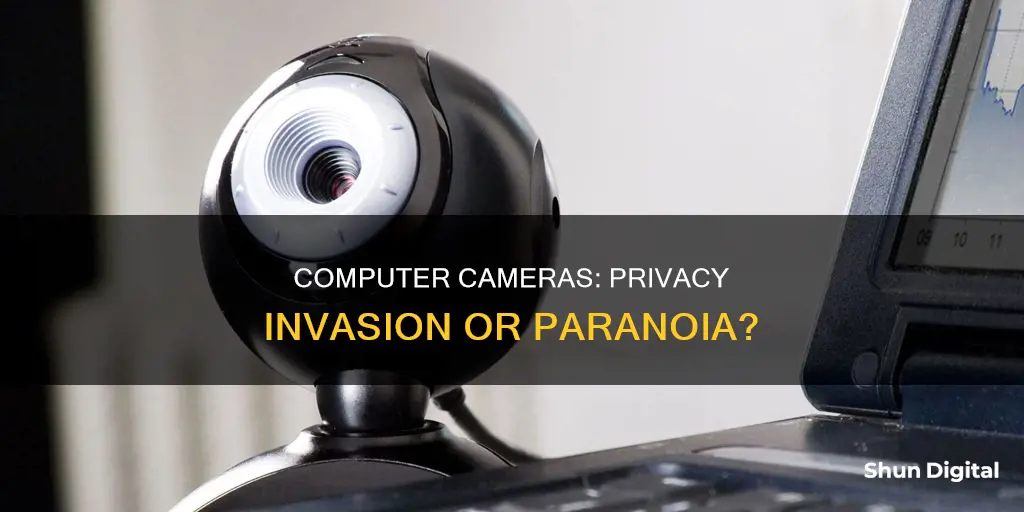
In today's tech-driven world, it's easy to feel like our privacy is being compromised. And it's not just our phones and laptops—even our computer cameras can be used to spy on us. While it may seem like a cliché Hollywood plot, it's not as far-fetched as you might think. Camfecting, or hacking into someone's webcam, is one of the most common ways that spies and hackers gain access to your personal life. In this article, we will explore the signs that your computer camera is being used to spy on you and offer tips on how to protect yourself from prying eyes.
| Characteristics | Values |
|---|---|
| Camera indicator light | On or blinking without user action |
| Browser extensions | Could be the cause of the camera light turning on |
| Applications | Could be the cause of the camera light turning on |
| Webcam process | Appears in the Task Manager |
| Audio and video recordings | Could be found in the webcam folder or elsewhere |
| Malware | Could be installed without user action |
| Suspicious movement | External webcams can move without user action |
| Webcam security settings | Could be changed without user action |
| Data flow | Could show spikes when the camera is accessed without user action |
What You'll Learn

How to know if someone is spying on you
It is possible for hackers to spy on you through your computer camera. They can design malware that hijacks your webcam, remotely installs it into your computer, and then starts to take videos and images of you from a remote location. If they are interested in your personal information, such as files stored on your computer and your regular browsing history, the malware can help them accomplish that, too.
- Check the camera's behaviour: If your camera is moving or rotating without your command, this could be a sign that someone is spying on you. Webcams often work with built-in microphones and speakers, so a misbehaving camera will likely affect the microphone and speakers as well.
- Monitor storage files: After recording footage via your webcam, the hacker will need to save it somewhere. This means that if a file appears out of nowhere, it could be a warning sign. Check for files you did not create, particularly in your webcam recordings folder. The hacker may also have relocated some of your files to a new folder or a location that you do not usually check, so be sure to comb through all your storage locations.
- Monitor the indicator light: If your webcam indicator blinks abnormally or turns on without your prompting, someone could be controlling it without your consent. However, other computer programs or browser extensions running in the background could also be using your webcam. On other occasions, the indicator will malfunction due to a technical problem with your computer.
- Check for background apps: Malware may be sneaked into your computer as normal applications, especially if you download apps from unsecured websites. Always be on the lookout for software or apps that are running on your computer without you having installed them.
- Check your data usage: If someone is watching you through your camera, they will receive a live feed of what your camera sees, or it will capture and save footage for them to collect later. Either way, sending or storing video uses a lot of data, so increasing data usage could be a sign that your phone is infected.
- Monitor video call performance: In addition to eating up network bandwidth, monitoring a person's phone camera in the background would impact the device's performance. If you find that video calls have suddenly become choppy and unstable despite a solid network connection, it could indicate that spyware is recording them or allowing an attacker to watch.
- Listen for strange sounds in calls: If you hear strange sounds when neither you nor the person you are talking to is speaking, it could be a sign that someone else is listening in or recording the call.
- Check your location permissions: Most spies are interested in more than just watching you through your camera. In addition to checking your camera permissions, it is important to check which apps have access to your location.
- Check your battery performance: Recording video requires a lot of resources, and frequent filming can quickly drain your battery. If your phone is losing charge faster than expected, someone may be hacking your camera to spy on you.
- Scan your device for spyware: The most effective way to tell if your camera has been hacked is by scanning your device for spyware. While there are no spyware scanners built into Android or iOS, apps such as Clario Anti Spy can help identify hidden threats and safely remove them.
If you suspect that someone is spying on you through your computer camera, it is important to take action. You can start by covering your camera with tape when it is not in use. You can also install a virtual private network (VPN) or use antivirus software to keep hackers at bay.
The First Camera: A Country's Legacy
You may want to see also

How to prevent spying
It is possible for hackers to spy on you through your computer camera. This is known as "camfecting", and it can be done by slipping remote-control malware into your laptop, giving hackers access to your personal files, messages, and browsing history. While an indicator light might alert you to a webcam hack, it is not always reliable.
- Use a webcam cover: Covering your webcam with tape or a plastic slider is a simple and effective way to prevent spying. Even Mark Zuckerberg and former FBI director James Comey reportedly use tape to cover their webcams.
- Disable your webcam: If you're not using your webcam, you can disable it through the device settings. This will stop most methods of gaining control as the malware will not be able to re-enable the camera.
- Uninstall webcam drivers: If you want to go a step further, you can uninstall the webcam drivers. This will ensure that your operating system has no way to work with the webcam, making it harder for attackers to gain access.
- Use antivirus software: Install reliable antivirus software with advanced protection against malware, spyware, and viruses. This will help detect and remove malicious threats before they can cause any harm.
- Avoid phishing traps: Be cautious of emails or messages from people disguising themselves as support agents. They may try to trick you into installing remote-access software that gives them access to your camera and its permissions.
- Be cautious on public Wi-Fi: Public Wi-Fi networks are vulnerable to hacking. Avoid accessing sensitive information or logging into important accounts when using public Wi-Fi. Consider using a VPN to secure your connection and protect yourself from snoopers.
- Scan your computer for malware: Regularly scan your computer for any malware or spyware that could be related to webcam hacking. Use a traditional virus scanner as well as anti-spyware software to catch any malicious programs.
- Be cautious of email attachments: Avoid opening email attachments from unknown senders. These could contain malware or Trojan horse files that can install webcam-related malware on your computer.
- Be wary of shortened links: Be cautious of clicking on shortened links on social media sites. Malware developers often use link shortening services to disguise the true destination, which could be a malware distribution site.
Focusing on Dahua Cameras: A Step-by-Step Guide
You may want to see also

Famous examples of spying
While there is a common perception that only hackers engage in spying through computer cameras, it is important to note that various entities have been implicated in such activities. In recent years, there have been instances of security services, schools, and even the NSA gaining access to people's webcams for surveillance or voyeuristic purposes.
The NSA and iPhone/BlackBerry Devices
One famous example of spying through computer cameras involved the National Security Agency (NSA). The Edward Snowden leaks revealed that the NSA had gained backdoor access to the cameras within iPhone and BlackBerry devices, compromising the privacy of countless individuals.
Webcam Blackmail
Another famous example of spying through computer cameras is the use of "webcam blackmail", where hackers gain access to people's webcams and capture images and videos of them in states of undress or compromising situations. These images and videos are then uploaded to voyeurism websites, or used to extort money or other demands from the victims.
The FBI and the Blackshades Program
In 2014, the FBI was involved in a controversial cyber operation called Blackshades, which gave users access to photographs, files, and keystroke records on victims' computers. This program also allowed users to activate the victims' web cameras to spy on them secretly. This incident brought to light the potential for government agencies to abuse their powers and infringe on citizens' privacy.
Universities and Facial Recognition Systems
Although not directly related to computer cameras, it is worth noting that many universities are considering implementing facial recognition systems that use on-campus cameras to track students and faculty. This raises concerns about privacy and the potential for misuse of such systems.
Don't Drain Your Camera Battery: Here's Why
You may want to see also

What hackers can do with the information
If a hacker accesses your webcam, they can do a lot more than simply spy on you. Here are some of the ways in which hackers can exploit the information they gather:
Blackmail and extortion
If a hacker records compromising footage of you, they could use it to blackmail or extort you for money or other demands. This is often a criminal hacker's intent when accessing someone's webcam. The hacker may threaten to send the footage to your contacts or make it public unless you pay a ransom.
Identity theft
With access to your webcam, hackers can also swipe additional personal information on your computer, which could be used for identity theft. They may be able to access your passwords, bank account information, private messages, and other sensitive data. This information can be used to steal your identity, commit financial fraud, or gain further unauthorized access to your accounts and devices.
Installation of malware and viruses
Hacking into your webcam could be a way for hackers to install malware or viruses on your computer or other devices. This malicious software can cause further damage to your system, compromise your security, and steal additional data. For example, Remote Access Trojans (RATs) are a type of malware that allows an attacker to remotely control a victim's device, turn on the camera without activating the light, and record and send video files to themselves.
Emotional and mental health impact
Being a victim of webcam hacking can have a significant impact on your emotional and mental well-being. It can leave you feeling shaken, abused, and violated. The knowledge that someone has been spying on you and potentially invading your privacy can be extremely distressing and may lead to feelings of anxiety, paranoia, or even post-traumatic stress disorder.
Corporate espionage and intelligence gathering
In some cases, webcam hacking may be carried out by tech-savvy corporate groups or government intelligence agencies for intelligence gathering and covert image capturing. These targeted attacks aim to gather restricted information for competitive or national security purposes.
Square Mode: Which Cameras Have This Feature?
You may want to see also

How hackers gain access
Gaining access to a computer camera is a process known as "camfecting". This is when a hacker takes control of a webcam remotely and can use it to watch anything within the webcam's field of vision.
There are several ways in which hackers can gain access to a computer camera. One of the most common ways is by sending the victim an innocent-looking application with a hidden Trojan virus. When the victim runs the application, the virus installs itself, giving the hacker control of the webcam. The hacker can then turn on the webcam and capture pictures and videos.
Another method is to exploit the webcam's internet connectivity. If a webcam connects to another device over the internet, it can give hackers a route into the device.
Hackers can also gain access by taking advantage of existing spy software, such as Remote Administration Tools (RATs) that are often installed in corporate environments.
In some cases, hackers may disguise themselves as support agents and contact the victim claiming there is an issue with their system. They may then trick the victim into downloading remote-access software, which allows them to access the webcam and manage its permissions.
To protect against webcam hacking, it is recommended to use a reliable antivirus program, cover the webcam when not in use, and avoid clicking on suspicious links or downloading attachments from unknown senders.
Surveillance Cameras: Public Access or Private Data?
You may want to see also







